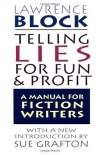Manual For Fiction Writers by Block, Lawrence (classic books to read .TXT) 📗

Book online «Manual For Fiction Writers by Block, Lawrence (classic books to read .TXT) 📗». Author Block, Lawrence
So much for the plan. The doctor's opening the door has let the cool air of reality into the house. But more has happened than that a plan has been proposed and dashed. The delicate relationship between the parties in the house has been forever changed. They who had been a family are now a collection of strangers ill at ease with one another.
But Mr. Trevor has one more zinger for us. Because the doctor realizes from a glance at the solicitor's letter that all of this has been for naught. Mrs. Abercrombie's instructions to her lawyers would be honored despite the fact that the will has not yet been drawn and signed; her intent was clear and her untimely death will not prevent her wishes from being carried out. Plunkett did not realize that, none of them did, and thus the flaws in their characters ruined their prospects, and it's far too late for the woman's last wishes to change things; these people, forever changed by their moral weakness, cannot possibly go on living together.
Do you see what I'm getting at? It's not the idea of Last Wishes that makes it a powerful experience for the reader. It's what the author has done with the idea, primarily in terms of the structure of its plot. I'm afraid I've ruined the story for you in order to provide this illustration, but in a larger sense I have not; a story as good as Last Wishes is not easily ruined. If you've an interest in short fiction, I would strongly urge you to pick up a copy of Angels at the Ritz and read the story for yourself. And read the rest of the stories while you're at it; Mr. Trevor makes a habit of this sort of thing.
CHAPTER 30
No More Mr. Nice Guy
I'M NOT much on Hitler jokes as a general thing, but here's one from somebody's old nightclub routine that has lingered in the mind. The fuehrer's in the bunker, see, in the spring of '45. Messengers bring him one piece of dreadful news after another. German forces are reeling back from catastrophic defeat on every front. The Allies are advancing in the west and the Russians are on the outskirts of Berlin. The Third Reich, built to last a thousand years, is collapsing.
All right, Hitler snarls. All right! They have gone too far! From now on, no more Mr. Nice Guy!
Ahem. Levity aside, boys and girls, the subject of today's class is motivation, and it would seem to me that?yes, Arnold?
Ê
Could you define motivation for us, sir?
Ê
I suppose so, Arnold. Motivation is the business of supplying your fictional characters with plausible reasons for them to act as you would have them act in order for your stories to be dramatically effective.
And motivation is not something which can be merely taken for granted, like blue eyes. You can just say that a character has blue eyes and let it go at that. You don't have to explain that his mother also had them, that her ancestors came from a village in Sweden where everyone was blue-eyed. You may mention as much if you want, but the reader will generally accept most of the physical aspects of your characters as given. He'll take your word for it.
He won't take your word that such a character feels a burning desire for revenge, or to right a wrong, or to get a better job, or to steal a car, or whatever you would have him do. He'll accept the ordinary?if your lead character is an accountant, let us say, he may add a column of figures without provoking a quibble from the reader. It is an ordinary part of an accountant's day to add a column of figures. But if he rushes off to British Columbia to extinguish a forest fire, or to light one, you'd better have furnished him with a reason for so doing.
Ê
Then motivation is necessary when a character does something extraordinary?
Ê
Hmmm. I guess that's as good a way as any to put it. It might be of more practical value to say that motivation is important at those points in a narrative where a reader might wonder why the characters are acting in a certain way when they might act in another, or not act at all.
There have been times in my own life when I have had particular difficulty supplying my characters with adequate motivation. One time, I recall, I went for several months without writing anything because I couldn't think of a single reason for any character to care strongly enough about anything to take any real action in any direction. Plots just wouldn't form themselves in my mind, or wherever in a person's anatomy they tend to take shape. On another occasion, I began writing several novels in succession, each of which died on the vine somewhere around page sixty, perishing out of a massive failure of the author's imagination. I couldn't summon up a reason for any of the characters to Go On, or





Comments (0)